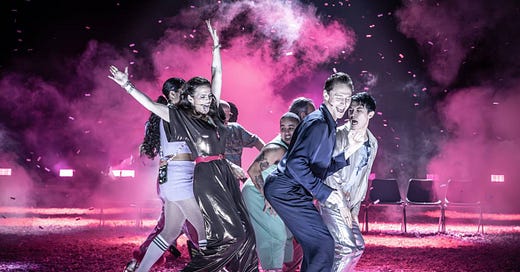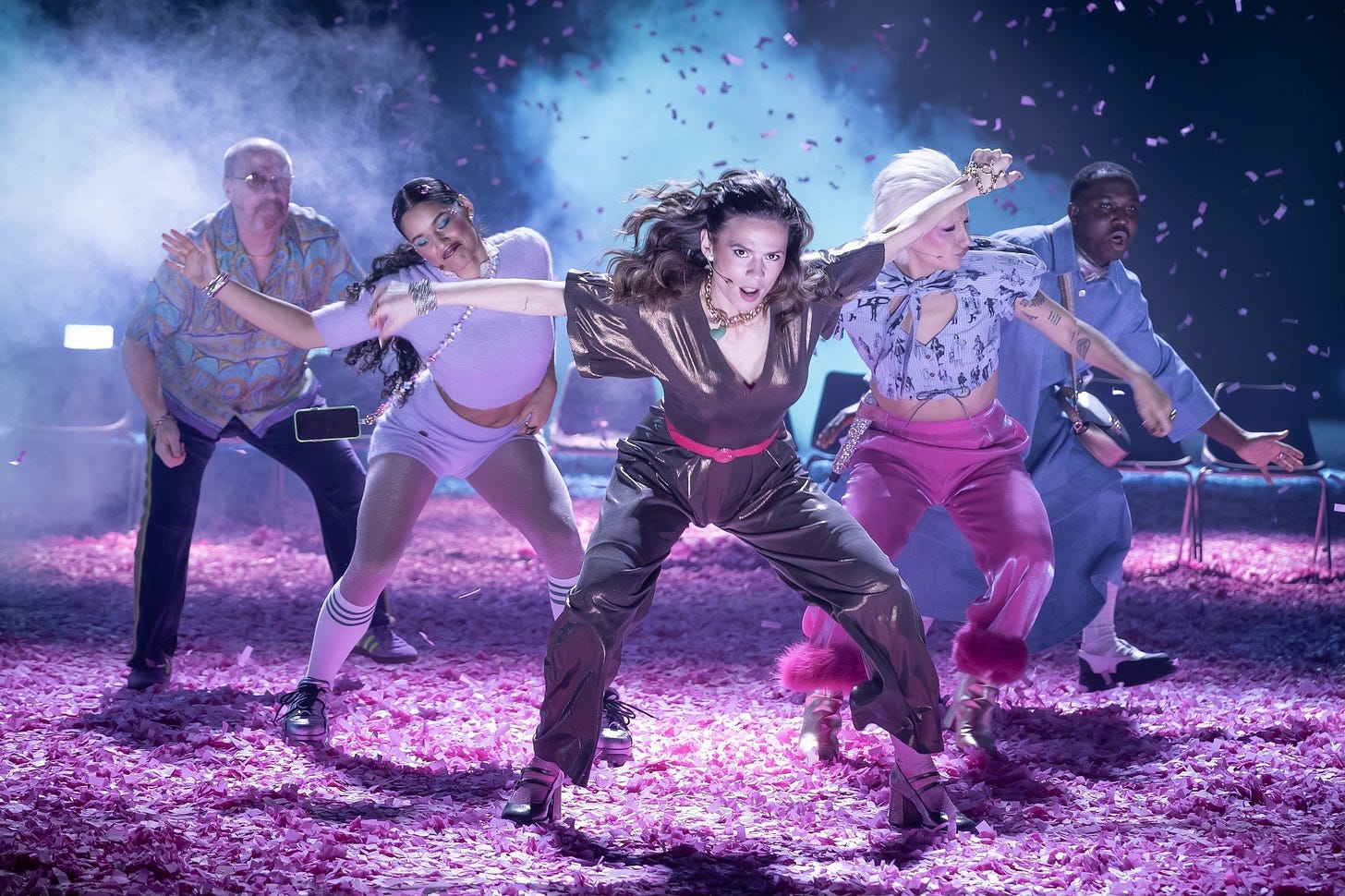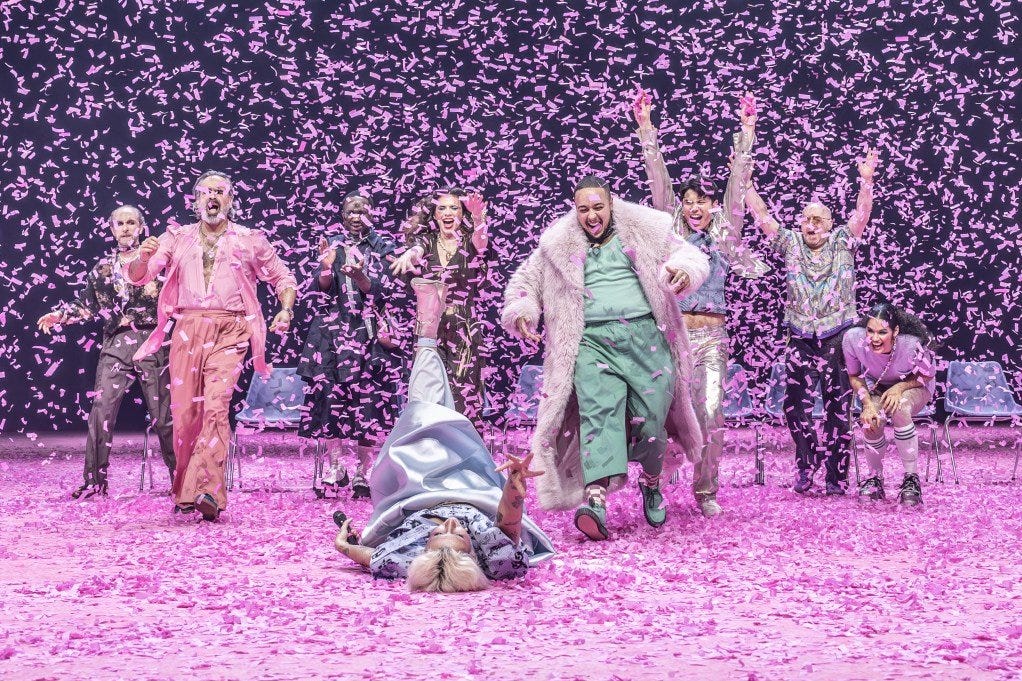In the pink: Jamie Lloyd's Much Ado About Nothing
On a fun, featherlight production of Shakespeare's comedy starring Tom Hiddleston and Hayley Atwell.
Hello, I’m still in London this week, interspersing trips to the theatre with attempts not to wince every time I’m reminded how much a pint now costs in this city. I’ve seen a real spectrum of work during my stay, which I’ll write about more in due course, but first some words on the most recent production from the prolific Jamie Lloyd - and on Tom Hiddleston’s ass.
If you want to support my writing while helping keep this Substack largely paywall-free (though there will be occasional paid subscriber bonus posts, like this one on Robert Lepage’s Faith, Money, War and Love), you can do so for just £5 a month or £50 a year. Or just share this newsletter with someone you think might find it interesting. That helps too.
Midway through Jamie Lloyd’s production of Much Ado About Nothing, someone carts a cardboard cut-out of Loki on stage and proceeds to give its crotch an energetic polish. It’s a moment that says to audience: we know. We know why you’re here and what you want and we’re going to give it to you.
Lloyd’s Much Ado was the second of two productions in a mini-Shakespeare season at London’s Theatre Royal Drury Lane, which featured most of the same supporting cast, alongside Hayley Atwell and Tom Hiddleston as the sparring Beatrice and Benedick, hence the less-than-subtle nod to the MCU.
Lloyd’s regular collaborator, the designer Soutra Gilmour – profiled here by Rosemary Waugh for Exeunt - has swapped out the chipboard boxes, plastic chairs and muted costumes of recent Lloyd productions for an explosion of pink. This might be the pinkest thing I’ve seen since Legally Blonde (yes, I’ve seen Legally Blonde). Pink confetti carpets the stage like shag-pile (a call-back, perhaps, to the carpet of petals in Lloyd’s 2016 production of The Maids). Pink confetti cascades from above, like someone left a big pink tap on. A vast, inflatable pink heart dominates the barn-like Drury Lane stage. The plastic chairs are still there though. Old habits and all that.
The costumes are similarly glitzy, with Hiddleston sporting an ‘auditioning-for-Strictly’ navy ensemble with a purple rhinestone belt, while Atwell rocks a mocha lamé jumpsuit. The production is set in a kind of sparkly never-ending party, a cruise ship limbo soundtracked by 90s bangers. There’s a lot of dancing. Tom takes every opportunity to shake his Hiddle, while Mason Alexander Park - ostensibly playing Hero’s maid, but also the house MC - belts out a selection of dancefloor staples, including When Love Takes Over. With a shiny microphone worn in a holster at their hip, and some serious vocal clout, they stand out amid a strong supporting cast.
Hiddleston and Atwell spend a lot of time addressing the audience directly, the latter mugging outrageously, flirting with the front row while doing that irritating clicky-winky thing some guys misguidedly think looks cool. I can’t remember if, at any point, he did finger guns, but it would not be out of place if he did. He exudes finger guns energy. It’s all supremely cheesy, but knowingly so. Fortunately, when Atwell and Hiddleston do get around to interacting, they have serious chemistry, very much accentuating the ‘merry’ part of the “merry war” between them.
The production also nods at the fact Benedick and Beatrice have a few years on Mara Huf’s perma-twerking Hero and James Phoon’s smooth, silver-suited Claudio. There’s something a bit try-hard about them, a suggestion that one of the reasons they’re so wedded to the dancefloor is because they both keenly feel a lack. For the masquerade scene, everyone dons outsize-animal heads (less Three Kingdoms, more Masked Singer). There’s a cute robot, a Tweetie Pie and a squidy thing, while Hiddleston, fittingly, is a soppy-eyed puppy. The physical comedy is similarly broad, with Benedick burying himself in confetti to hide from the conniving Leonato and co, before plunging through a trapdoor.
The production fully acknowledges the celebrity status of its leads. Hiddleston flashes his magnificent abs, does some naff dance moves, and his line about being loved by all ladies is met with a vigorously affirmative response by the audience, while it’s heavily implied that the term ‘ladies’ is a broad church. As I mentioned, they even go so far as to bring out cardboard cut-outs of Loki and Captain Carter to be pawed at and salivated over. I actually sort of wished they had leaned harder on the celebrity thing. Fame – particularly MCU alumni levels of fame - is a kind of Illyria, and if any production was going to explore that, it could have been this one.
Despite the voluminous froth, Hiddleston and Atwell know how to land the emotional beats, how to convey the characters’ ache to have their desire requited and to inject some real heart into their scenes together. They bring a lucidity to the verse and even mine some pathos from the text between all the thrusts and gyrations.
This isn’t really a surprise. They’re both theatre creatures. I still remember Hiddleston’s scene stealing turn as Cassio in a 2007 production of Othello at the Donmar Warehouse, scene thievery in this instance being no mean feat given this was a production starring Chiwetel Ejiofor at the absolute top of his game (and Ewan McGregor). Hiddleston was a pretty decent Coriolanus too, in a production largely remembered for its post-battle shower scene. In 2017, he reunited with Thor director Kenneth Branagh (still a weird sentence to write) to play Hamlet at a RADA fundraiser for which tickets could only be acquired by ballot. I was lucky enough to land one and while it was a petty trad production in many ways, I thought he was at his most interesting in the scenes in which Hamlet was vibing with his gal pals – Horatio, Rosencrantz and Guildenstern were all played by women – than in the more straight-up soliloquising and swordplay. In Lloyd’s 2019 production of Betrayal, in which he starred opposite Charlie Cox and Zawe Ashton, he gave good emotional turmoil and proved adept at doing whatever the opposite of ugly crying is.
Similarly, Atwell is a triple Olivier nominee for her work on A View from the Bridge (the Lindsey Posner one, not the Ivo Van Hove one), Ian Rickson’s production of Rosmersholm and Alexi Kaye Campbell’s The Pride, a production directed by, you’ve guessed it, Jamie Lloyd.
As for Lloyd himself, he’s someone with whose work I have a complicated relationship. He clearly believes in making popular theatre, but his ubiquity sometimes works against him. Having started out as a Pinter-whisperer, directing an acclaimed production of The Caretaker in Sheffield, in 2013, he launched the Jamie Lloyd Company with a season of work at the Trafalgar Studios, which included a visceral production of Macbeth starring James McAvoy. Since then, he has been largely staging productions of classics with big name stars attached (plus the occasional Lloyd Webber musical). When this formula works, as with the McAvoy Macbeth, it really works, but as anyone who saw his Doctor Faustus with Kit Harington can attest, this is not always the case. Sometimes his approach misfires in other ways, as it did when he cast Tom Holland opposite relative unknown Francesca Amewudah-Rivers in Romeo and Juliet, which unleashed a wave of the ugliest racism towards her, the most abhorrent abuse from people affecting to be appalled that someone other than an Italian girl was playing Juliet while simultaneously not giving a single shit about Romeo being played by a kid from Kingston.
In 2018, Lloyd oversaw 'Pinter at the Pinter', a six-month season of all Pinter’s one-act and short plays staged at the theatre which bears his name, which featured a real ice-down-your-spine performance from the late Antony Sher in One For the Road. Over recent years, however, his and Gilmour’s aesthetic has become increasingly stripped back – to the point where it’s possible to play Jamie Lloyd bingo: Head mics – check, utilitarian costumes – check, plastic chairs - check.
This paid off brilliantly in his 2019 Cyrano which featured McAvoy (again), on insanely charismatic form, relishing every twist of Martin Crimp’s nimble script, but the same cannot be said of his dour take on The Tempest with Sigourney Weaver as Prospero, which hardly anyone seems to have liked.
All of which is to say that it’s easy to see why people felt this glittery Much Ado was a breath of fresh air. It also feels as if Lloyd is sending up his reputation a little. But having kept the dial wedged firmly in the ‘fun’ zone for the first half, the production then has to navigate the pivot into darker terrain in the second half, and it sort of does, at least initially. The way everyone turns so readily on Hero, the way she is humiliated in front of everyone, with Leonato (Forbes Masson, doing an excellent job) going so far as to wish his daughter dead, feels more than usually like it’s the product of online manosphere bullshit. But even though Atwell sells Beatrice’s fury on her cousin’s behalf, her injunction to ‘kill Claudio’ Is met with laughter and, not I think, laughter of shock and dismay, but with the sense that this is just another punchline. This is always a weird moment to negotiate but there’s even less room for manoeuvre here with everyone primed to have a good time. I guess there’s something to be said for the fact Hero is never broken by her mistreatment. She’s resilient in the face of all this toxicity and dickishness in a way that somewhat dilutes the power of these scenes. (Having complained in the past about Lloyd overdoing it in scenes in which women are brutalised, I’m aware there’s a degree of hypocrisy in my saying this). I guess I just didn’t believe that this Hero would forgive Claudio so quickly, or her dad for that matter.
I found myself thinking a lot about what it means for a show to be accessible while watching this. This is a production that goes out of its way to make the plot easy to follow. The Dogberry scenes have been jettisoned, though this is no great loss, and the soundtrack and overall vibe seem designed to hit a millennial sweet spot (as Andrzej Lukowski captured so well in his review for Time Out). While 25,000 seats were released at £25 for the under 30s and those on benefits, some tickets have been going for north of £300 (when writing about the West End I’m always aware I’m writing about shows I’d struggle to access in other circumstances). You could argue that this kind of pricing model allows the cheaper tickets to be subsidised by those who can afford it and, anyway, the top-end pricing is in line with stadium gig tickets. It certainly contributes to the sense of this show as event theatre, and though it delivers on both the ‘event’ and the ‘theatre’, there’s a tension between the two at times.
The production is acutely aware of what a sizable portion of its audience have bought tickets to see, or in some cases not, given some people are leaving at the interval to secure their spot in the queue for the stage door, which is apparently something that happens a lot. (The woman next to me spent much of the show taking surreptitious photos while enthusiastically WhatsApping, but she stayed the course).
Ultimately, this Much Ado is an exercise theatrical candyfloss, albeit one performed by people who can eke moments of intimacy out of the cavern-like Theatre Royal Drury Lane. It culminates with Hiddleston leading an audience of people drinking £17 glasses of prosecco in a Back Street Boys singalong. It really wants you to have fun and, reader, I did have fun, while also at times feeling like I was watching Lloyd’s doing the directorial equivalent of Russell Crowe in Gladiator, facing the crowd with his arms outstretched and asking: “are you not entertained?”
This week in European theatre
A round-up of festivals, premieres and other upcoming events over the next seven days.
Manhunt - This new play by Robert Icke, a director renowned for his adaptions of classic texts, is inspired by the life and death of Raoul Moat, who became the subject of the UK’s largest manhunt in 2010. It premiered at the Royal Court in London yesterday - the reviews so far have been intriguingly mixed, veering from this to this - and runs until 3rd May.
Katzelmacher - Rainer Werner Fassbinder’s 1969 film about the experiences of a young ‘guest worker’ from Greece in Bavaria in the 60s is the basis for Emre Akal’s new production made in conjunction with the artist duo Mehmet & Kazim. It premieres at the Munchen Kammerspiele on 9th April.
Elizabeth! - Author Mareike Fallwickl and director Fritzi Wartenberg join forces to explore the many different iterations of Empress Elizabeth of Austria – known as Sisi - in history and in popular culture. Stefanie Reinsperger stars in the one-woman show which premieres at the Burgtheater in Vienna in the 11th April.
Thank you for reading. If you have any recommendations, tips, or thoughts about this newsletter, you can reach me on natasha.tripney@gmail.com







